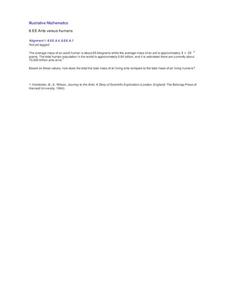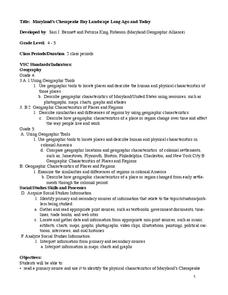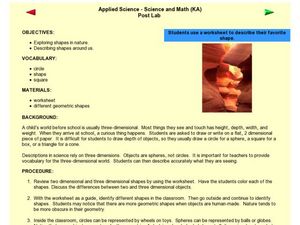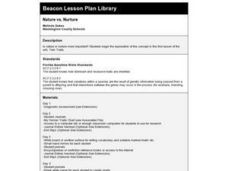California Academy of Science
Natural Resources Bingo
Bingo isn't just a silly game, it's a great way to practice all types of skills. After reviewing that the earth is composed of natural resources, what those natural resources are, and sustainability, the class plays a game of bingo. The...
Population Connection
Meeting Human Needs
How to meet the needs of people around the globe—a question many ask. The fifth in a six-part series about human population and its effects on the globe, the eye-opening lesson includes discussion, a homework activity, and an in-class...
Curated OER
Myths and Legends on Natural Disasters: Making Sense of Our World
Young scholars explore different natural and manmade disasters through a webquest. In this earth science lesson, students explain their causes. They also discuss how disasters affect society.
Forest Foundation
The Nature of Trees
Young botanists examine the different parts of tress and then draw parallels between the functions of these parts and the function of parts of the human body.
Illustrative Mathematics
Ants Versus Humans
You would think that humans make up more mass than ants do on this planet, but think again, and this time by performing calculations. Middle schoolers use scientific notation to compute and compare the estimated total mass of all humans...
Curated OER
Human Activity and the Environment
Students review and analyze graphs and tables as a group. They develop their graph and data analysis skills by converting data tables from Human Activity and the Environment into graphs.
ESL Flow
Natural Disasters
Students examine different natural disasters. For this natural disaster lesson plan students complete a worksheet that has the students label the pictures of natural disasters and answer questions.
Bridge
Mercury - Mercury is Rising
Hold a discussion in your class about the increase in mercury being found in fish that are caught commercially as food for humans. Given a worksheet, learners then calculate how much fish a person can safely eat each month to remain...
National Constitution Center
Civil Liberties and Rights Worldwide
How do governments differ in how they protect human rights? While the United States prides itself on its Bill of Rights, other countries have their own ways of protecting citizens' liberties. An interactive website, paired with...
Core Knowledge Foundation
Taking Care of the Earth Tell It Again!™ Read-Aloud Anthology
A read-aloud anthology closely examines human impact on the Earth while boosting reading comprehension skills. Through stories, scholars examine the concepts of natural resources, pollution, garbage, and recycling and brainstorm ways to...
Curated OER
The Correlation Between Human Population Growth and Dwindling Natural Resources
Eighth graders predict human population growth. In this lesson, 8th graders discuss the length of time needed to double the human population, work in groups to chart population growth and predict population growth in the...
Science Matters
That’s An Otter Story
Young scientists discover how sea otters' habitats have changed due to human impact. Through conversation, video observation, and story reading, scholars identify how human interactions change a specific ecosystem in both positive and...
Curated OER
Maryland’s Chesapeake Bay Landscape Long Ago and Today
Combine a fantastic review of primary source analysis with a study of Captain John Smith's influence on the Chesapeake Bay region in the seventeenth century. Your young historians will use images, a primary source excerpt, and maps...
Curated OER
Natural Selection and the Peppered Moth
Learners study natural selection and its process in the peppered moth. In this evolution lesson, students read about the concept of natural selection as suggested by Charles Darwin. Learners then complete a natural selection simulation...
Atlanta History Center
Civil Disobedience and the Atlanta Student Movement
What tactics are used in civil disobedience? Learners study the conditions in Alabama that led to the establishment of the Atlanta Student Movement, as well as consider the nature and effectiveness of civil disobedience.
Howard Hughes Medical Institute
The Molecular Evolution of Gene Birth and Death
More than 90 percent of humans' DNA doesn't code for anything! Scholars watch a presentation as they answer questions relating to gene mutations. They read details, watch videos, and view animations supporting the concepts. The questions...
National Park Service
A Natural Resource Called Peace
Get your pupils outside and teach them about peace at the same time! Scholars create a list describing peace, hike outside, add to that list, and later create poems. The exercises support differentiation for your individual classes as...
Curated OER
Applied Science: Exploring Shapes in Nature
Explore geometry with your young mathematicians! First, have them color in different two-dimensional and three-dimensional shapes. Then take them on a walk around the classroom. Can they identify different shapes using the target...
Curated OER
Tree Lesson
Learners compare and contrast characteristics of conifer and hardwood trees. After collecting samples of branches around the school, they classify the branch as hardwood or conifer. Groups of students identify given twigs. They go...
Curated OER
Where Is Xinjinag?
Students geographically recognize the territory of Xinjiang Province by identifying the physical landscape and important cities. They see how human rights issues have affected the global, political, and economic arena in Xinjiang.
Curated OER
Nature vs. Nurture
Eighth graders investigate the concept of nature versus nurture in human development through this series of lessons.
Curated OER
Climate Change
Students explore environmental care by researching the impact of human beings on our planet. For this climate change lesson, students utilize the Internet to read informational text about climate change and the effect it will have on our...
Curated OER
Growth Stages 1: Infancy and Early Childhood
Students explore biology by completing a human growth worksheet. In this child development lesson plan, students read assigned text about the human birth process and the ideal growth patterns for a child. Students answer study questions...
Curated OER
The Many Uses of Trees
Young scholars list all the ways humans use trees and tree by products. In this lesson students watch a video, discuss the impact trees have on humans, and research common products made from trees. The young scholars use their findings...
Other popular searches
- Philosophy of Human Nature
- Democracy and Human Nature
- Essays on Human Nature
- Human Nature Hobbes
- Human Nature Good
- Enlightenment Human Nature
- Human Nature in Plays
- Human Nature Environmental
- Poetry on Human Nature
- Aristotle Human Nature
- Human Nature Enviromental

























